August brings mixed emotions for teens and families. The long days of summer wind down, and the excitement (and nerves) of a new school year begins. With new classes, sports, and social activities, students also encounter new friendships and relationships. While many of these are positive, some can become harmful.
At Snoqualmie Valley Health, we want to help adolescents recognize the warning signs of unhealthy relationships, practice safety in social settings, and know where to turn for support.
Recognizing Unhealthy Relationships
Unhealthy relationships aren’t always physical. Emotional, psychological, and verbal harm can be just as damaging. Teens should learn to watch for red flags, including:
- Control and jealousy: Does someone try to control your daily activities, isolate you from friends, or monitor your online behavior (sometimes called “stalking”)?
- Name-calling or verbal abuse: Do they insult you, embarrass you in public, or dismiss your feelings by saying you’re “overreacting”?
- Coercive behaviors: Do they pressure you into things you don’t want to do, such as drinking, using drugs, risky activities, or sexual practices that make you uncomfortable?
Remember: everyone deserves safe, supportive, and respectful relationships—whether they’re friendships, family ties, or romantic connections.
Personal Safety Tips for Teens
While it’s never your fault if something happens, you can take steps to protect yourself in social settings:
- Share your plans: Let someone know where you’re going, who you’ll be with, and when you expect to be home. Use location sharing with a trusted parent or friend.
- Plan for transportation: If alcohol or substances are involved, arrange a safe ride with a designated driver, family member, or rideshare.
- Protect your drinks: Always get your own drink (alcoholic or not) and keep it with you.
- Stay alert when walking alone: Avoid noise-canceling headphones and stay aware of your surroundings.
Support and Resources at Snoqualmie Valley Health
If you experience sexual assault, intimate partner violence, or another unsafe situation, help is available. In Washington, teens ages 13 and older can access reproductive and mental healthcare without parental consent.
At Snoqualmie Valley Health, our Forensic Medicine Acute Care Service provides confidential, compassionate care, including:
- Complete forensic exams and evidence collection
- Injury documentation and secure photo storage
- Assistance with reporting to law enforcement or crime victim compensation
- STI testing and treatment
- Pregnancy prevention, including Plan B, Ella, and urgent IUD placement
- Medication-assisted abortion and pregnancy counseling
- Behavioral health services (in-house and referral)
- Case management for connecting with regional resources
How to Reach Us
Snoqualmie Valley Health SAFE Program
9801 Frontier Avenue SE, Snoqualmie, WA 98065
24/7 Phone: (425) 831-2300
Program Manager: Katherine Thompson | katherinet@snoqualmiehospital.org
Final Thoughts
Starting a new school year should be exciting, not dangerous. By learning to recognize unhealthy behaviors, practicing safety strategies, and knowing where to turn for help, teens can feel empowered and supported. Snoqualmie Valley Health is here to provide confidential care and compassionate resources for any student in need.

